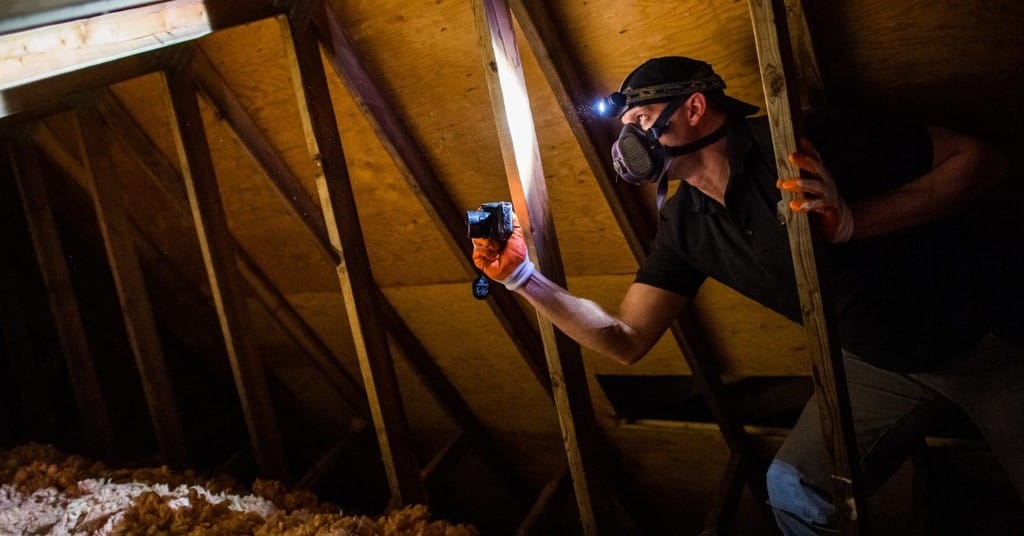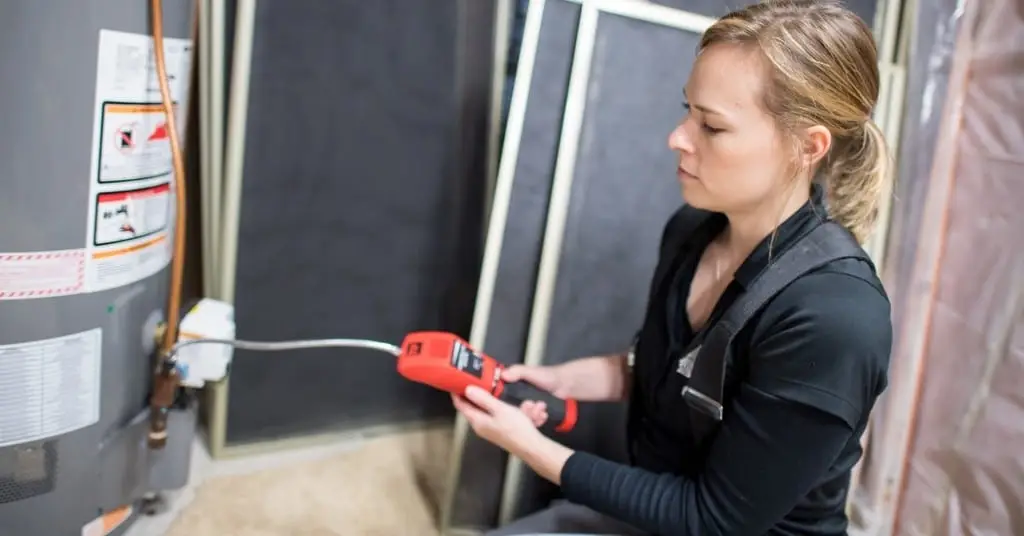Do you want to become a home inspector? A home inspection is a lucrative field with a median salary of $61,640. It’s also a good option if you want to switch careers or venture out on your own after working in the field.
Home inspectors analyze the key areas and systems of a house, such as a basement, siding, and furnace. They look for anything that could be hazardous, broken, defective, or in poor shape due to age or wear and tear. Then they create a report for a potential buyer to advise them on the condition of the house.
Becoming a home inspector requires familiarity with construction, plumbing, and electricity. It also requires education as well as knowledge of different types of homes. You also need to figure out whether you want to start your own home inspection company or work for someone else.
How do I become a home inspector?
Becoming a certified home inspector typically requires training and a licensing exam. When you start working, establish a solid reputation and decide if you want to open your own business.

1. Find out home inspector licensing requirements for your state
In more than half of the United States, local and state governments require home inspectors to have licenses. In other states, there is no required process to become a home inspector. Take a look at our full list of home inspection licensing requirements by state.
Licensing requirements can include:
- Obtaining a state-issued home inspection license
- Completing a home inspection training, besides having a high school diploma or GED
- Completing a certain number of field hours of practice
- Completing a certain number of inspections carried out alongside a licensed home inspector
- Completing a criminal background check

2. Enroll in home inspector training
Even if your state doesn’t require licensing for home inspectors, you should enroll in a training course.
Online and in-person home inspection courses like American Home Inspection Training can prepare you for your career. The International Association of Certified Home Inspectors also offers many courses, some of which are free.
The courses vary by price, format, name recognition, customer service, and ease of use. Check which courses meet your state’s requirements before you start and choose a format that works best for you.

3. Get your home inspector license
If you live in a state that requires a home inspector license, the next step is to take and pass your state’s licensing exam. Schedule your exam after completing your course.
Be sure to study before your home inspector license exam, because they can be tough with a low pass rate. Luckily, many useful practice tests and exam preparation materials are available online.
What if I fail to get my home inspection license?
Operating a home inspection business without a license can get you in trouble. You can’t start a home inspection business without a license if it’s required. You are risking potential legal issues if you operate a business without a license.
4. Invest in the best home inspection tools
Home inspectors need a variety of tools to do their jobs well. This includes keeping the client’s home clean as well as keeping you safe.
The key tools for a home inspector are a flashlight, telescoping ladder, and electrical testers for GFCI outlets. Other important tools include a moisture meter, 4-foot level, an awl, and a tape measure. Read more about the best tools for home inspectors here.
5. Choose to start your business or work for a home inspection company
Once you’re established, decide if you want to work for others or create your own business.
Both options have pros and cons and it’s a good idea to consider them before deciding which way you want to go.
Working for a home inspection company
- Less pressure. Working for a home inspection company means you don’t have to juggle as many tasks as a business owner.
- No start-up costs. When you join a home inspection company, you don’t need to spend money to cover the startup costs of running a business.
- Connections. Joining an established firm means you don’t have to build your connections to get work.
- Job security. When you work for a company, you don’t need to worry about failing as a new business owner.
Running your own home inspection business
- Be your own boss. When you run your own business, you are in charge of everything.
- Flexibility. You can make any changes your want and adjust your pricing and tactics.
- Value. When you work for yourself, you take credit for all the work you do and keep all the connections that you build
- Direction. As a business owner, it’s up to you to decide how and when to grow your business.
If you decide to build your home inspection business, be sure to take the proper steps to build and grow:
Establish an LLC
The most common business structures for home inspectors are sole proprietorships and LLCs. Other business structures include partnerships and corporations.
Each business type has pros and cons, but an LLC provides is easy to set up and protects your personal assets. If you’re not sure what type of business is right for you, contact a tax or law professional for advice.
Register for federal and state taxes
This entails registering for an EIN through the IRS, which is free of charge. State taxes will vary, so be sure to look up your local requirements. Different types of companies will present different tax scenarios.
Open a business bank account
This will allow you to keep your personal and business assets separate. Using your personal bank for business costs makes it harder to keep your expenses in one place.
Set up an accounting system
Set up an accounting system like QuickBooks to track your income and expenses. This software helps you to see where your money is going and also prepares you for filing taxes.
Get set up with home inspection software
As your business grows, you’ll need software to help with appointments, reminders, invoicing, and more. ISN offers one of the best software programs for home inspectors. It can save you a lot of time and money and you can sign up for a 30-day trial to learn more about it.
Market yourself
If you run your own business, marketing can help generate new leads and strengthen your relationships. Staying connected with the real estate market in your area is your best source of new business. Your first marketing steps should include
- Setting up your website. Having a clean website is a must, especially as some home inspections can now be done virtually.
- Building a professional social media presence. This makes it easier to network in the home inspection and real estate industries.
- Using a brand logo. This is a simple, memorable, and easy to read is one best marketing tools for your home inspection business. It will keep your brand top of mind for consumers and allow you to market your business on many platforms. Creative logos are the key to success in most industries.
6. Get insured
Whether you’re working for yourself or someone else, you need both general liability and errors and omissions (E&O) insurance. Your employer may have a policy that covers you, but it’s up to you to make sure you’re protected. Learn more about insurance requirements here.

7. Establish your professional reputation
Reputation is everything for home inspectors. You’ll get more work if clients enjoy working with you. For business owners, this can mean more referrals and positive reviews to help grow your business. Go the extra mile for every client and build relationships with realtors, a key source of new business.
Always meet your deadlines, arrive on time for appointments, and keep communication open. And don’t forget to treat every customer with the utmost respect when inspecting their homes. Wear disposable booties and bring clean drop cloths to protect floors. When you leave, offer customers a copy of your business card to encourage referrals. You need to earn great online reviews and keep your skills up-to-date by continuing your education.
You can also join a home inspector association to stay connected and up to date with important things happening in your industry.
8. Stay up to date and expand your services
Many states require continuing education classes to keep home inspector licenses up to date. Check your state or certifying organization’s requirements to stay aware of what classes you need. For example, InterNachi inspectors need 24 hours of CE classes each year.
For both individuals and business owners, building your knowledge and services is a great way to provide more value to clients. If possible, get the training for add-on services, such as home mold and radon inspections. Consider getting a license for sewer scoping, mold, asbestos, and other specialty inspections.

More certifications for home inspectors
- A deck inspector certification allows you to examine a deck for structural issues
- A radon testing certification teaches you how to test for radon in homes
- A mold inspector certification teaches you to identify different types of mold and understand how they affect a home
- A commercial inspector certification teaches you how to inspect commercial spaces for wiring, construction, plumbing, and more
- A wood destroying organisms (WDO) certification teaches you how to find wood damage caused by termites and other WDO’s
- A garage inspector certification helps you identify structural damage and problems in the garage
Frequently asked questions about becoming a home inspector
How long does it take to become a home inspector?
It takes an average of 2-3 months to become a home inspector. During this time, you can finish your home inspector course, and get and get some experience. Later you can decide whether you want to work for a home inspection company or start your own business.
What is a home inspector’s salary?
Home inspectors make a median income of $61,640 per year. That figure can vary depending on different states and cities.
How do I grow my home inspection business?
There are many ways to grow your home inspection business. Establish good relationships with real estate agents and be active in the home inspection community. Always offer superb customer service to become the best home inspector in your area. There are also more advanced marketing steps you can take to expand your presence.
Good home inspection software is also critical to scaling and managing multiple inspectors. ISN offers a free 30-day trial, as well as pricing that ensures you pay only for what you need.
Becoming a home inspector: final thoughts
The $4 billion residential home inspection industry presents lucrative opportunities. As a home inspector, you can make a difference in the home buying and selling process for buyers and owners.
So what are you waiting for? There’s no time like the present to start your new career.

